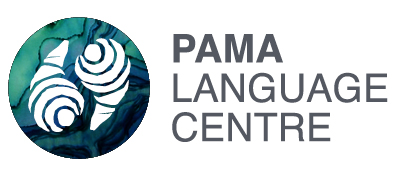Guugu Yimiithirr Lesson 4
Short conversations
We’ve learned the word for “this” – yiyi, and we’ve learned to say short sentences. Now we’ll practice a conversation with the words for “that” and “what”.
nhayun – that
nganaa? – what?
We also need the words for “Yes” and “No”. Yes is easy to remember:
yuu – yes
The word for “No” is Gaari:
gaari – no
The words in in our vocabulary now include:
yiyi – “this”
nhayun – “that”
nganaa? – “what?”
ngathu – “my”
nhanu – “your”
yuu – “yes”
gaari – “no”
gaban – “book”
nambal – “money”
… and a few more words.
The important thing for this lesson are the first seven words: yiyi, nganaa, nhayun, ngathu, nhanu, yuu, gaari. We don’t know so many words for objects yet, but you can use some English words for objects to practice making sentences.
Below are a couple of two-line conversations:
Conversation 1.
“Yiyi nganaa?” (What is this?)
“Nhayun gaban.” (That is a book.)
Conversation 2.
“Yiyi nganaa?” (What is this?)
“Nhayun ngathu nambal.” (That is my money.)
Notice
In a Guugu Yimithirr question, the words often come in a different order to English. We say “This what?” – Yiyi nganaa?
Questions
In Yiyi nganaa? we have a question word: nganaa. But how do we ask a question if there’s no question word? How do we say “Is this your book?
In Guugu Yimithirr we show with our voice that it’s a question. Listen to the rising voice in this question:
A bit extra
In English we usually ask a question by putting a verb first:
“ARE you hungry?”
“DID you go?”
“CAN you go?”
In Guugu Yimithirr the order of the words usually doesn’t show the meaning.
The question means “Don’t you know that we don’t eat the same kind of meat?” (said by a dog to a chook.)
Using the words we have learned, try to translate these conversations from English to Guugu Yimithirr:
1.“What is this?” “That is a book.”
2. “What is this?” “That is my book.”
3.“Is this my money?” “Yes, that’s your money.”
4. “Is this my money?” “No, that’s my money.”
5. “What is that?” “That’s my money.”
TRANSLATIONS:
1. “Yiyi nganaa?” “Nhayun gaban.”
2. “Yiyi nganaa?” “Nhayun ngathu gaban.”
3. “Yiyi ngathu nambal?” “Yuu, nhayun nhanu nambal.”
4. “Yiyi ngathu nambal?” “Gaari, nhayun ngathu nambal.”
5. “Nhayun nganaa?” “Nhayun ngathu nambal.”
SUMMARY OF LESSON 4
With the words for “this”, “that” and “what” we can practice speaking Guugu Yimithirr. You can put English words in sentences; the important thing is that you get started speaking.
WORDS IN LESSON 4
nhayun – “that”
nganaa – “what?”
GRAMMAR FACTS IN LESSON 4
In Guugu Yimithirr we show that a sentence is a question by using an asking tone of voice. English is different; in English a question has certain words at the beginning, such as “Do you…” or “Can you…”.
TEST YOURSELF
Now go to the Quizlet web site to practice what you learned in this lesson:
